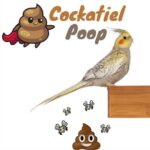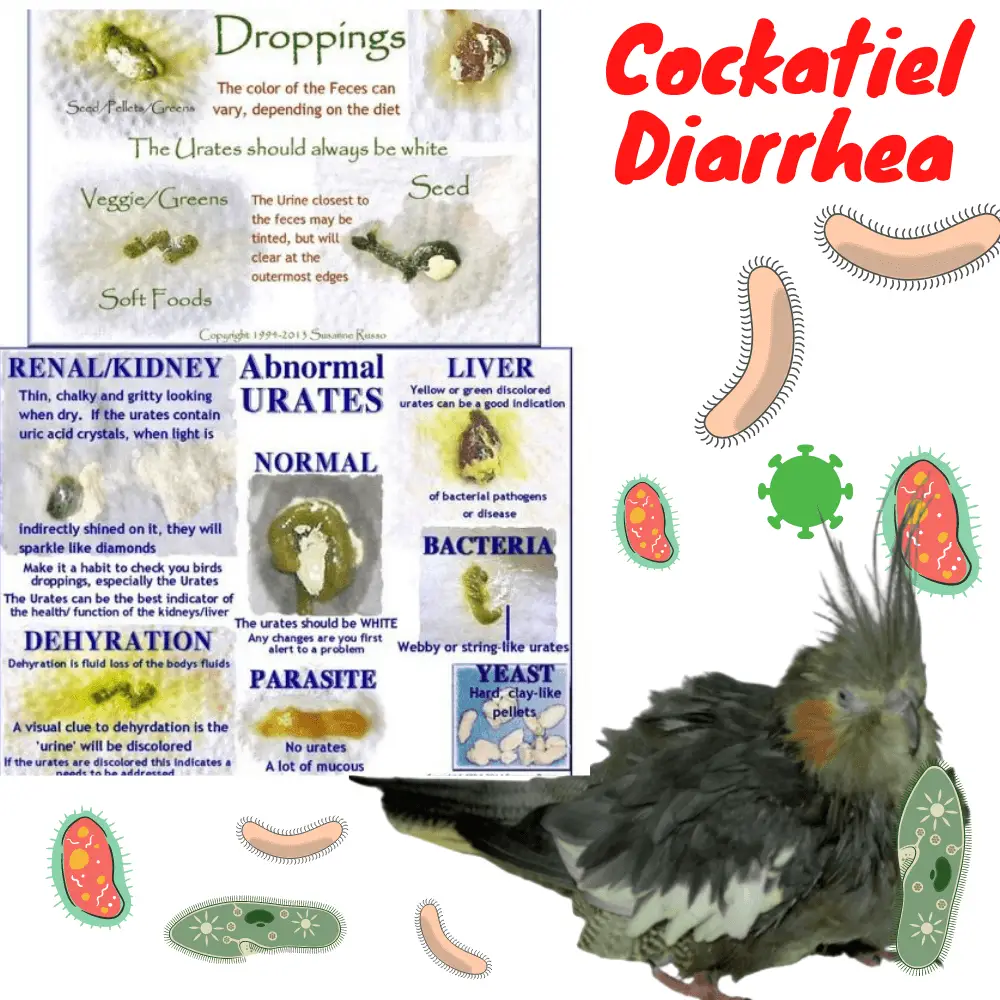
When your cockatiel is sick, it’s important to find out which disease it’s getting quickly. If he is taken from diarrhea, it can be something difficult to see in birds. Their droppings are naturally liquid, as they contain a mixture of feces and urine, which is why it can be difficult to know if he has diarrhea. However, by regularly observing the droppings, noticing other signs of illness, and giving him the care he needs, you can quickly and effectively treat his diarrhea and the disease that caused it.
Observe signs of diarrhea
Observe the bottom of the cage. If you have had your bird for a while, you should know what its usual droppings look like on the bottom of the cage. If their consistency changes and they become more liquid, your bird probably has diarrhea.
- Cockatiel droppings are usually a mixture of clear liquid (the bird’s urine produced by the kidneys) and feces of a light color. The color of the latter will be different depending on what you feed him.
- You must be able to tell the difference between urine and feces in its droppings. If you don’t see solid feces in the droppings, your bird may have diarrhea.
- You need to change the paper at the bottom of the cage at least once a week and while you do, take the time to notice what the droppings look like. Know what they look like when the bird is healthy to get a better idea of a possible problem.
Identify behavioral signs of illness. Cockatiels know very well how to hide the signs of disease. However, you could still be able to find them if you know what to observe. Find changes in their behavior, for example :
- he no longer smoothes his feathers,
- he is lethargic,
- he no longer sings as usual,
- he is no longer hungry,
- he looks uncomfortable.
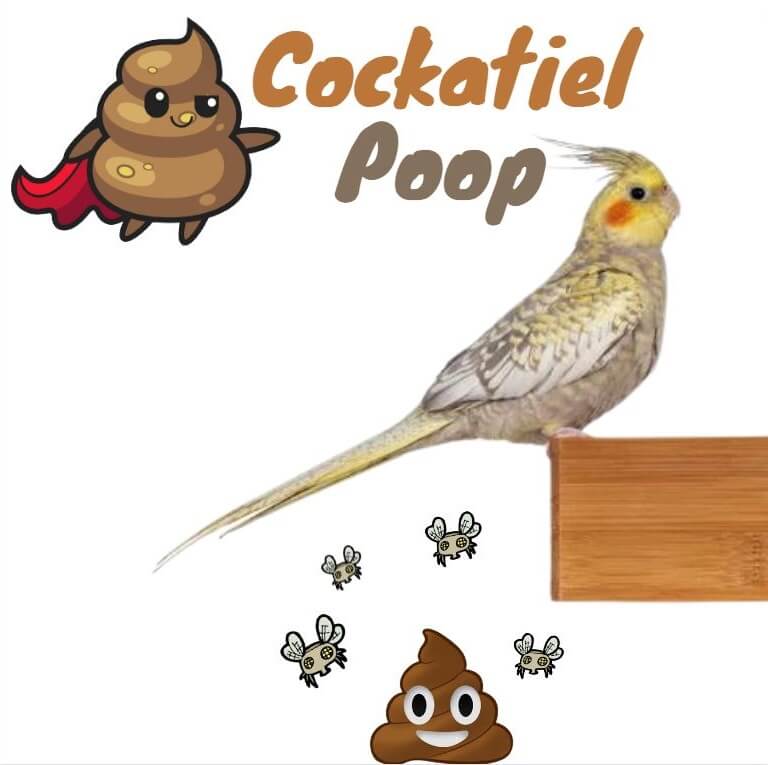
Find signs related to the disease. Diarrhea is usually a symptom of a specific disease like salmonella. If your bird has it, you should look for other signs of illness. This will help you know if he is really sick. Here are some of the signs of illness you need to look for :
- he vomits,
- it regurgitates,
- it has secretions in the nostrils or eyes,
- its feathers are ruffled and poorly maintained,
- there is blood in his droppings that look black.
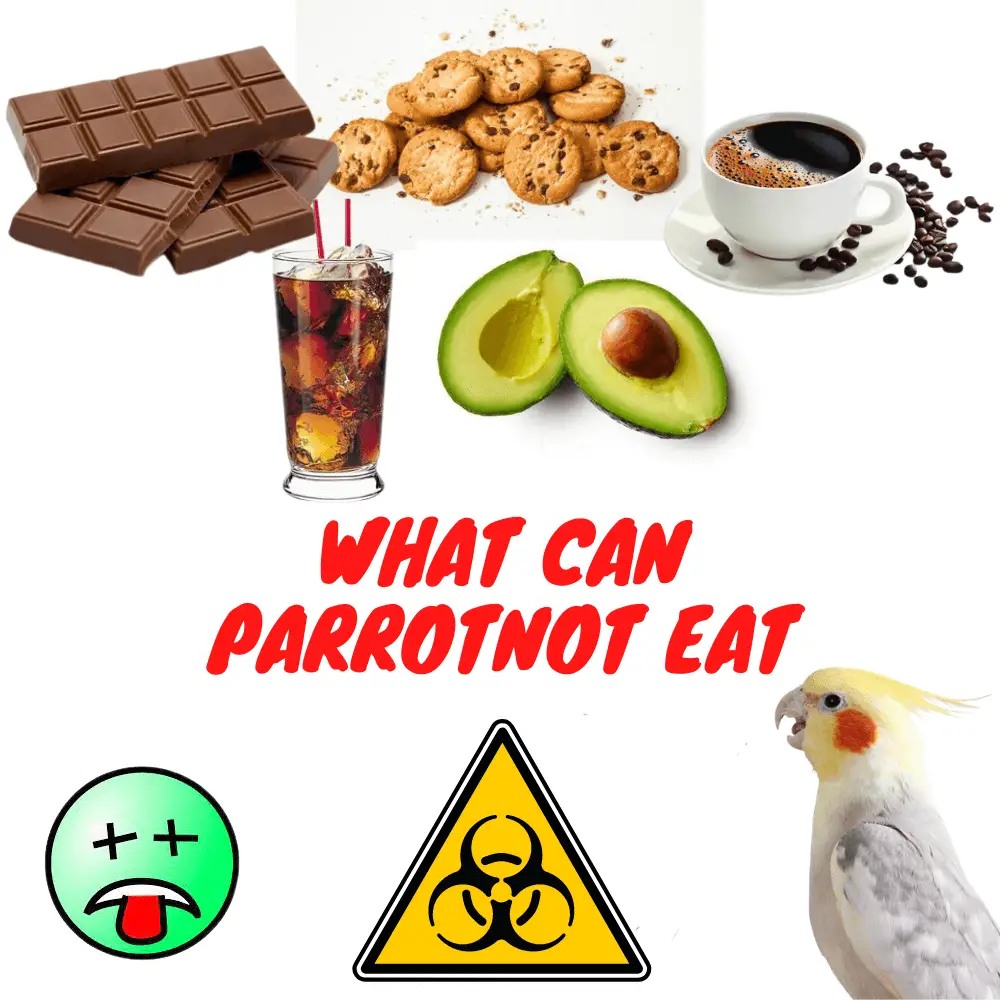
Find possible causes in its environment. In some cases, cockatiels can come into contact with things they shouldn’t touch when you let them out of their cage. If you’ve let him explore the house without watching him, find areas that look stirred and ask yourself if the objects present could be toxic to your pet. Here are some of the dangerous products he might have come into contact with :
- toxic foods such as chocolate, caffeinated beverages, and alcohol,
- medicines for humans,
- toxic metals such as lead and zinc,
- pest removal products such as rat poison,
- poisonous plants such as lilies, poinsettias, arums, etc.
Take the cockatoo to the vet
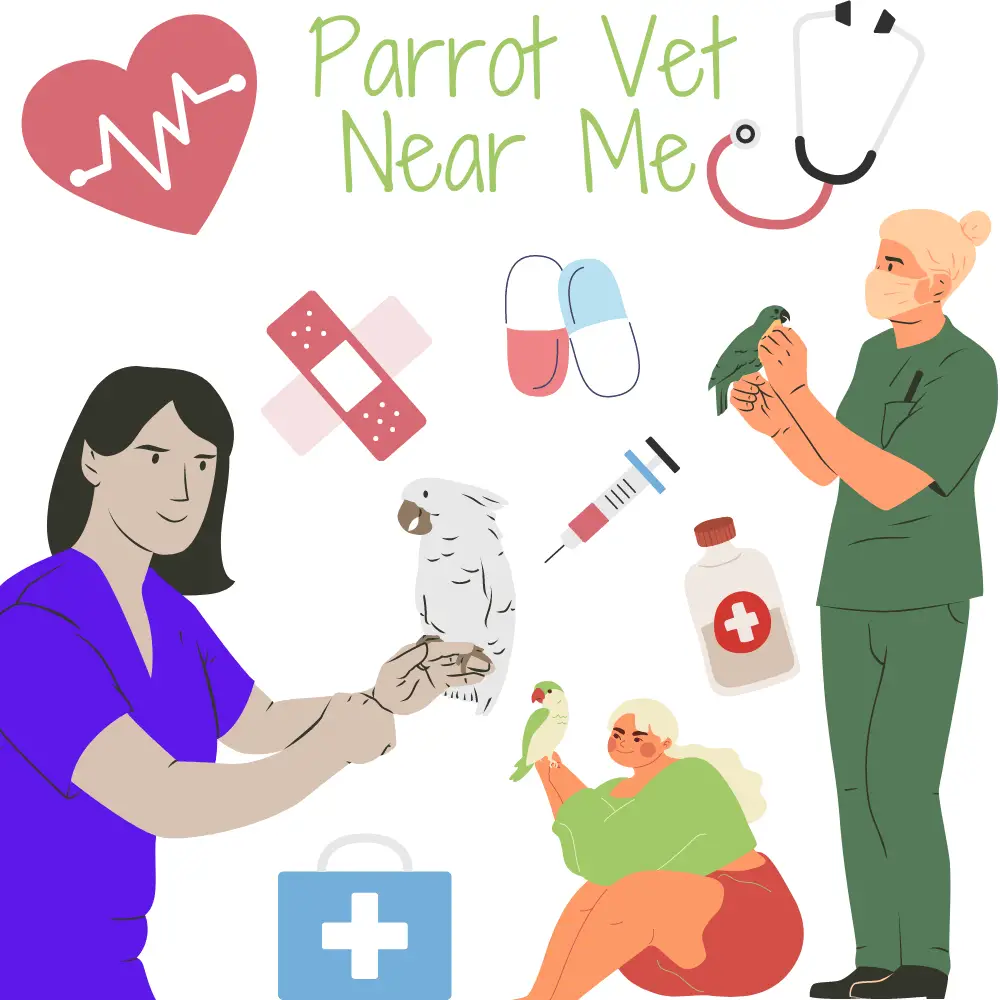
Has the bird been examined by a veterinarian? If you have observed physical or behavioral signs that indicate a disease, you should take him to a Parrot veterinarian. A veterinarian will be able to examine the animal’s health and diagnose a specific problem by testing it.
- Blood tests and X-rays are usually given to cockatoos.
- Common causes of diarrhea in these animals include bacterial infections, viral infections, fungal infections, toxins, diet changes, and intestinal obstructions.
Follow the veterinarian’s treatment suggestions. Depending on the cause of diarrhea, your veterinarian will suggest different types of treatment. This could include changes in diet, lifestyle, or environment.
- In the case of a serious bacterial or fungal infection, the veterinarian will likely prescribe medications to give him. In general, it will be antibiotic or antifungal.
- If the bird has a viral infection, you can only help it by preventing it from becoming dehydrated and supporting its immune system to fight the virus.
- They may also suggest temporary or long-term changes to your cockatoo’s diet. This could include a change in seeds or the temporary removal of fruits or vegetables from his diet to make his droppings stronger.
- In the case of severe bowel obstruction, the veterinarian may suggest surgery to remove the obstruction.
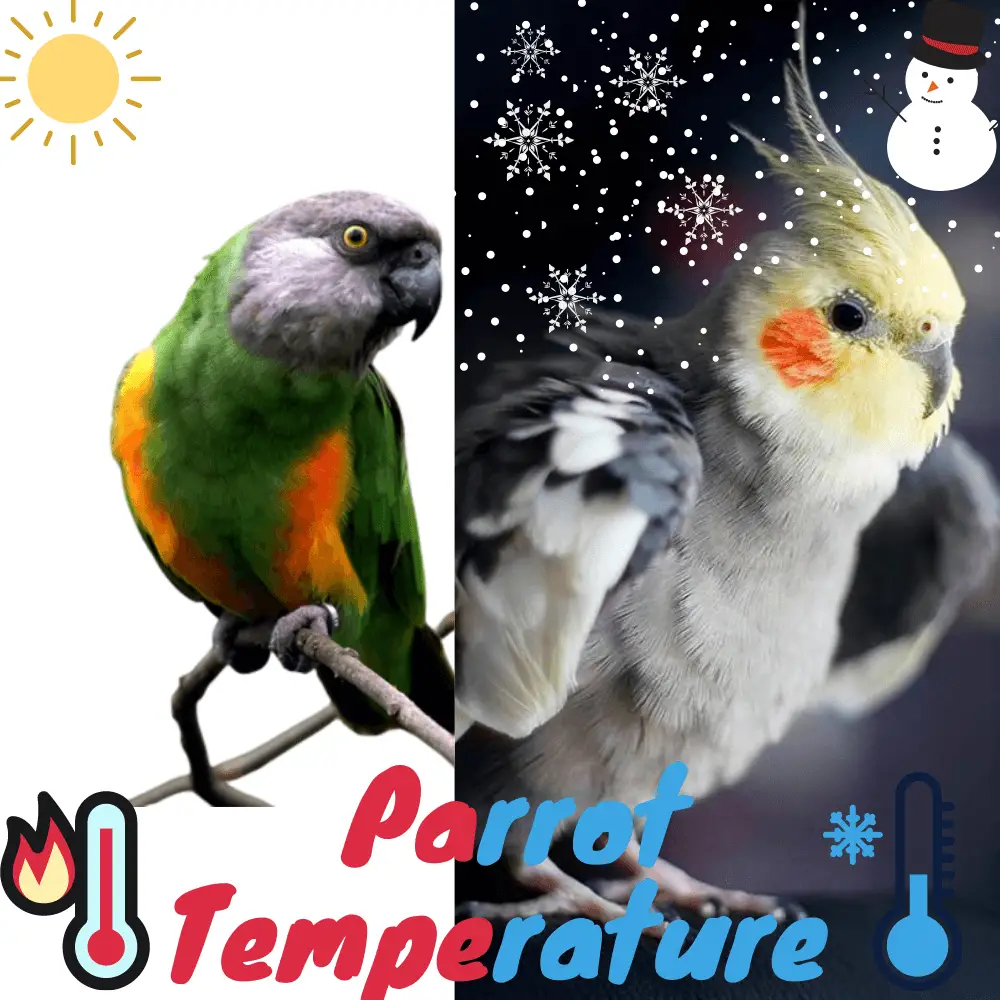
Bring warmth to it. When caring for it at home, you need to install another heat source near the cage, because sick birds tend to lose a lot of their heat. Use a bird lamp to warm it up.
- Do not rely on a normal lamp, because you can not use it during the night without disturbing the sleep cycles of the bird. In addition, some standard bulbs could release toxic fumes.
Continue to assess their health. During treatment at home, you should continue to assess his health. Do not believe that the treatment suggestions given by your veterinarian will cure your bird’s disease. Monitor her diarrhea and other symptoms and talk to the vet if symptoms continue or worsen.
- If the health of the cockatoo does not improve after treatment, do not hesitate to take it back to the veterinarian. It is important for his health to treat as effectively as possible.
Avoid diarrhea
Has it been examined regularly by the veterinarian? Even if he does not show signs of illness, you should still have him examined regularly by the veterinarian. Preventive care can find diseases that are harder to see, such as those that cause diarrhea and prolong your pet’s life.
- Veterinarians can also help by identifying and eliminating parasitic infections that are a common cause of diarrhea.
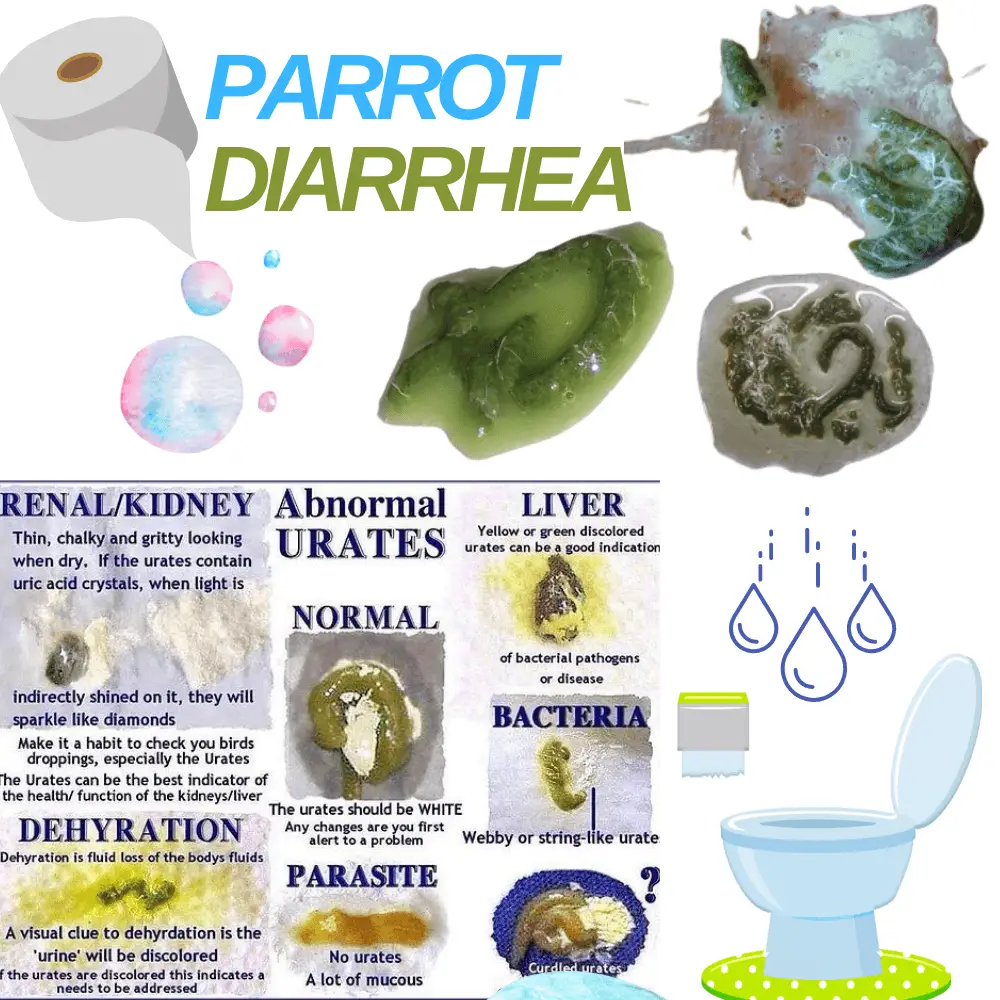
Make diet changes. Sudden changes in diet are often a source of diarrhea in the cockatoo, as they disturb its digestion. If you need to change his diet, do it little by little.
- Add a little of the new foods to the old ones. Over several weeks, increase the number of new foods you give him until there are no more old foods.
Keep his cage clean. Diarrhea can be a sign of many diseases, which is why you will better prevent diarrhea by limiting its exposure to diseases. The most important thing to do to protect him from diseases is to clean his cage.
How To Set Up a Cockatiel Cage
- You can do a quick daily cleaning by changing the contents of its bowl of food and water. You should also replace the paper at the bottom of the cage every day.
- Regularly clean the cage thoroughly. You have to take out the bird and everything in it. Clean each of the objects he uses and disinfect the cage.
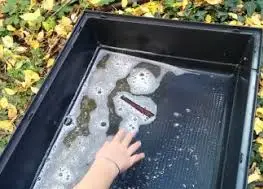
Quarantine new birds. To prevent diseases from spreading, you need to keep new birds in separate cages when you bring them home. It is essential to make sure that newcomers do not have diseases that they will transmit to others to avoid the appearance of diarrhea in your birds.
- Keep new birds in a separate room for thirty days. You also need to completely separate the items you put in the cages like food and water bowls.
Cockatiel diarrhea, Digestive diseases in parrots and other pet birds have very diverse origins. A balanced diet is the first prevention against many of these diseases, and a regular clinical examination with a stool examination is essential. We will develop diseases of the beak in a separate article.
Manure analysis
The analysis of droppings is the preamble to any diagnosis of digestive disease and must be carried out once or twice a year. For a pet bird owner at home, it is good to know what normal droppings look like with its 3 different components:
- Feces: this corresponds to feces, which take the form of a brown or dark green sausage. The presence of undigested seeds is abnormal.
- Urates: they correspond to the solid part extracted by the kidneys, white in color and pasty in appearance, irregularly placed on the feces.
- Urine: it is transparent and is arranged around the other two components. A good number of suspected diarrhea are actually an increase in the amount of urine, this is called polyuro-polydypsia.
The analysis of the droppings by a veterinarian makes it possible to assess several elements:
- The presence of normal bacterial flora or not
- Indicators of malnutrition and degree of severity
- Any presence of abnormal yeast or parasite eggs
It is totally impossible to say that a parrot is in good health without having carried out a saddle examination because an animal in a situation of malnutrition or parasitosis will not necessarily show symptoms immediately.
The main causes
Digestive diseases can affect all stages of the digestive tract and thus lead to various symptoms. We look for the causes of diarrhea, regurgitation, or weight loss in 2 main types of causes:
- Digestive causes:
We speak of a digestive cause when the origin of the digestive disease is directly in the digestive tract. These can be viral causes, as in the case of PDD (Proventricular Dilatation Disease, also called “proventriculus disease” or bornavirosis ), bacterial causes (Chlamydiosis, bacterial enteritis caused by E. Coli, Salmonellosis, Yersiniosis, etc.
parasitic causes such as coccidiosis, or trichomoniasis, which particularly affects pigeons, budgies, and cockatiels, and fungal causes such as candidiasis.
Some of these diseases cannot develop in healthy birds, they are called opportunistic diseases. For this reason, it is essential to evaluate a possible state of malnutrition, which decreases the immunity of the bird, modifies the constitution of its mucous membranes, and imbalances the normal and healthy bacterial flora of the digestive tract.
Finally, there are traumatic causes (burn or injury to the crop during force-feeding) and foreign bodies.
- Extra-digestive causes:
An extra digestive cause is a disease that is located on an organ outside the digestive tract and results in symptoms such as diarrhea or regurgitation. It can be an organ failure, such as liver and kidney failure. As the first cause of hepatic insufficiency, one finds inadequate food at the origin of hepatic lipidosis.
heavy metal poisoning was initially a digestive cause, but chronic poisoning leads to the fixation of metal particles in the bone matrix and kidneys of the bird. In this case, there may be heavy metal poisoning when the original metal object has been eliminated by the bird.
An x-ray without a metallic object does not, therefore, exclude heavy metal poisoning, the blood test yes!
Finally, another somewhat surprising cause is… Behavior! Indeed, regurgitation behavior is sexual behavior in some parrots, which thus feed their partner.
Sometimes only the sight of the loved one (who may be the human owner) is enough to trigger regurgitation, just like the hyperactivity of some parrots. Other birds, especially males, may trigger anorexia during courtship.
Cockatiel diarrhea
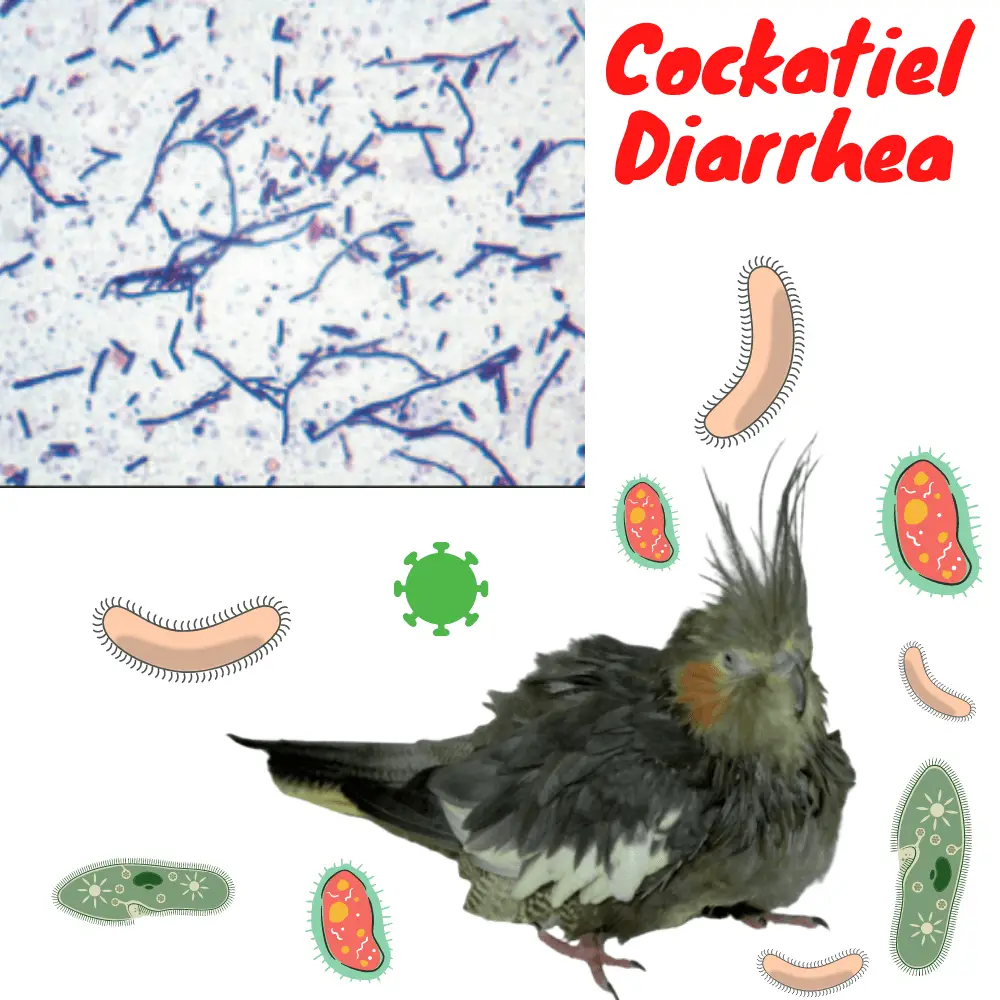
Symptoms
The symptoms can be very varied. It can be simply a weakness (Parfois causing fall from the perch), modification of droppings (diarrhea or polyuro-polydypsia), or anorexia. Regurgitation may also be observed, difficulty in swallowing (dysphagia), signs of nausea. Maldigestion can be observed with the presence of seeds in the droppings. In some cases, coelomic pain may cause pecking.
The droppings can take on various colors depending on the digestive disease: black feces are generally the sign of the presence of digested blood, as for example during colibacillosis, light green stools almost fluorescent can be due to an infection by a bacterium of the type Streptococcus, the presence of green pigment in the urine or urates can be a sign of liver disease or chlamydia.
Diagnostic
Parrot diarrhea treatment: Several types of the examination carried out at the clinic or in the laboratory may be indicated:
- Cytology: it is carried out on a cloacal and/or crop swab. A damp cotton swab is used to take the sample, which is then stained and observed on-site under a microscope. It can make it possible to observe abnormal cells during malnutrition (hyperkeratosis of the epithelium), the proliferation of yeasts, bacteria, and parasites.
- Stool analysis: it can also be cytology, as we described in our first paragraph. It can also be a parasitological examination of the stool, this time carried out in the laboratory.
- The blood test: allows for exploring the extra-digestive causes (hepatic insufficiency, kidney disease) and PDD (serology or PCR). A dosage of heavy metals (more frequently lead and zinc) can also be sent.
- X-ray: It allows to detect the presence of a metallic foreign body in the digestive tract, can sometimes allow observing an increase in the size of one of the organs (hepatomegaly, nephromegaly, dilatation of the proventriculus)…
- The scanner: it allows to observe in much more detail the contents of the coelom because it consists of a multitude of images of sections of the bird which allows a 3D analysis. Its main advantage is the absence of invasiveness, its disadvantage is anesthesia, its cost, and its lack of availability outside large veterinary centers.
- Endoscopy: this consists of the use of a camera to directly observe the organs through the air sacs. This examination is more invasive than the scanner, however, it allows the realization of samples (biopsy) which can have a great interest to diagnose the PDD with certainty, a tumor, to remove a foreign body in the crop…
Processing
Depending on the origin, which has been demonstrated by your veterinarian, he may be required to set up an antibiotic, anti-inflammatory, anti-fungal treatment, a metal chelation treatment, etc.
In certain cases, assisted refeeding (gavages) and /or hospitalization may be necessary.

